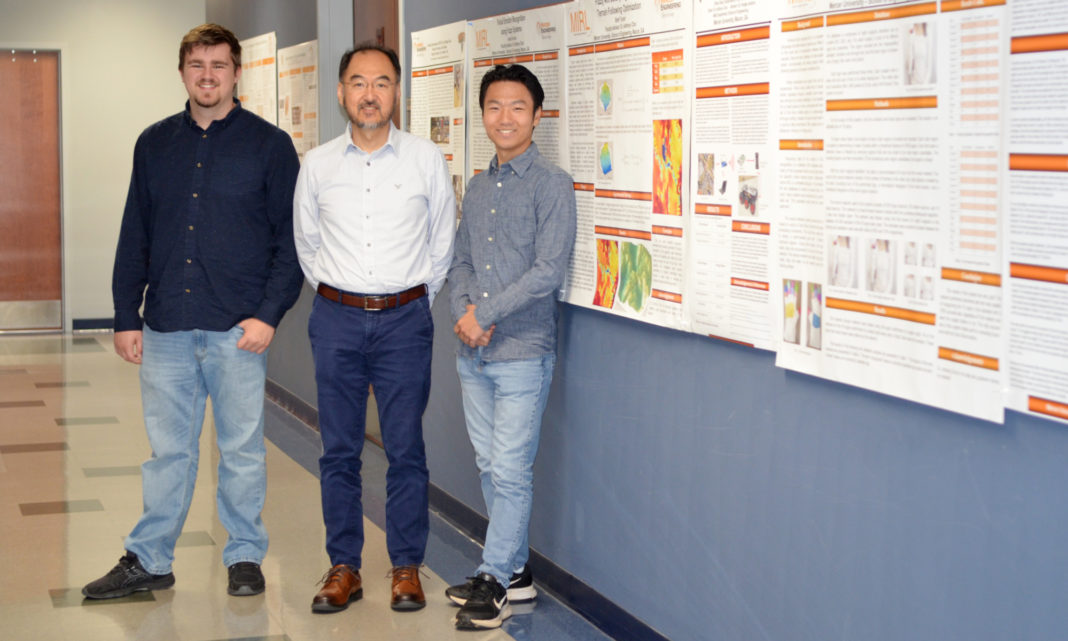MACON – Mercer University Professor of Electrical and Computer Engineering Dr. Anthony Choi and undergraduate students William Caden Hamrick and Ethan Choi have been selected to participate in the Council on Undergraduate Research’s (CUR) Scholars Transforming Through Research (STR) program.
The six-month professional development program, which runs October-April, offers undergraduate students and faculty mentors the opportunity to develop communication and advocacy skills to leverage the impact of their research by conveying their story to stakeholder groups such as funding agencies, association partners, elected officials, future employers, community and beyond.
A total of 75 teams were selected this year representing 62 institutions in 28 U.S. states. Mercer had one of three teams selected in Georgia, alongside Augusta University and Georgia College and State University.
The Mercer project aims to produce an artificial intelligence-driven chatbot, called Nightingale, that is capable of holding realistic follow-up calls with medical patients via telephone and generating a summary of the conversation and an urgency score for the physician. The project uses artificial intelligence to solve the real-world problem of providing patient-centered follow-up care in order to increase medical adherence without placing undue burden on medical professionals.
“By participating in this program, we hope to gain a better understanding of how to convey the impact of our research,” said Dr. Choi, who also serves as director of Mercer’s Machine Intelligence and Robotics Laboratory. “We know that our research has the potential to help people, especially those in rural communities. However, without the proper skills to communicate the goals and impact of the research, it will not affect the target population in a substantial way.”
Mercer was recognized this past spring by CUR as one of three recipients worldwide of the Campus-Wide Award for Undergraduate Research Accomplishments (AURA), which recognizes institutions with exemplary programs that provide high-quality research experiences for undergraduates.
“As a faculty member, doing research with undergraduates was an eye-opening experience. It was far more rewarding and pleasurable than my initial expectations,” said Dr. Choi. “I have personally witnessed tremendous growth in my undergraduate students through their exposure to exciting research and their ability to rise to the challenge, even in the context of cutting-edge research.”
At Mercer, 51% of residential undergraduates participate in research, and the University’s culture of service-based research has been strengthened through programs such as Mercer On Mission and Research That Reaches Out, as well as independent research projects like Nightingale.
“During my research experience as an undergraduate, I feel that I have grown both in my technical skill and my general ability to do research. My experience has helped confirm for me that I want to have a career in research and has led to my decision to pursue graduate school,” said Hamrick, a senior computer engineering major. “Overall, I believe my undergraduate research experience has helped me find the career path I want to pursue and allowed me to grow as a professional and as a person.”
“My undergraduate research project was a good learning experience for all students involved,” added Ethan Choi, a junior computer engineering major. “The work was challenging but rewarding in the skills we gained while on the job, allowing us to have an easier time getting used to a real job in engineering in the near future of our careers. The experience will also help us get jobs by allowing us to put this research on our resumes. To add to the list of impacts, it also helps us learn how to better work with others.”
The School of Engineering researchers are collaborating on the Nightingale project with Dr. Robert Sarlay, assistant professor and senior director of medical practice at Mercer University School of Medicine (MUSM); Dr. Anne Montgomery, assistant professor at MUSM and biostatistician at the Georgia Rural Health Innovation Center (GRHIC); and Chris Scoggins, director of special projects at GRHIC.
About the School of Engineering
Mercer University’s School of Engineering, founded in 1985, offers innovative and academically challenging programs that provide students with a comprehensive education, featuring a solid foundation in mathematics and sciences, a core engineering curriculum, a range of courses in engineering specialties and a strong emphasis on communication technologies. The School is consistently ranked by U.S. News & World Report as one of the top three master’s-degree-level engineering schools in the Southeast. Known for its breadth of instruction in its undergraduate program and its five-year joint bachelor’s and master’s degree program, the School combines technical education with hands-on laboratory experience. Mercer engineers can look forward to joining fellow alumni in companies such as Robins Air Force Base, Mercer Engineering Research Center, Northrop Grumman, Georgia Power, Manhattan Associates and Gulfstream Aerospace.
Featured photo by Jan Crocker










